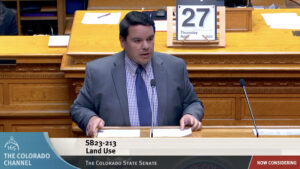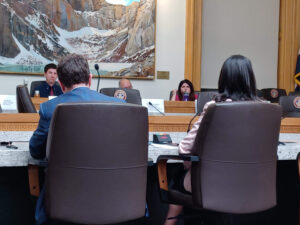Less than one week after a Senate committee gutted a bill to create statewide standards that would allow more development of urban housing, a House committee on Tuesday stuffed most of those extricated guts back into the bill.
The move, made after a long hearing in the House Local Government and Housing Committee, could allow for Gov. Jared Polis’ centerpiece housing bill — a major reform of state land-use rules design to spur home construction — to pass in a version similar to how it was introduced. However, Senate Bill 213 first must receive its expected approval from the House and then face the gauntlet of concurrence from a Senate in which key members from both sides of the aisle fought to remove all its aspects that pre-empted local control.
The nine amendments passed by the committee re-added key provisions to require urban cities to allow higher-density residential construction along key corridors and in transit-oriented communities and let property owners build accessory dwelling units like granny flats as a right. They also roll back minimum-parking restrictions in transit-oriented areas, align state economic-development strategies with other strategic plans like its greenhouse-gas emissions goals and require cities to study displacement risks and implement strategies to avoid gentrification.
About the only major piece of the bill as introduced in late March that did not get added back on Tuesday was an allowance for property owners in areas zoned for single-family homes to build “middle housing” from duplexes to six-plexes on their properties. The reinserted requirements around key-corridor and transit-corridor density also no longer apply to rural resort job centers like most mountain towns — a key rescission needed to win the support of some senators who shape up as swing votes.
A winding path for land-use reform bill

Colorado Senate Majority Leader Dominick Moreno speaks in his chamber about Senate Bill 213.
Senate Majority Leader Dominick Moreno, the Commerce City Democrat sponsoring SB 213, agreed to remove all pre-emption language in order to get the bill through the Senate Appropriations Committee that would have killed it otherwise. As it left the Senate on a largely partisan 20-12 vote, the bill required the state and local governments to undertake housing-needs assessments, established a committee to study further needs and banned restrictions on modular housing and the number of unrelated people allowed to inhabit a dwelling.
But sponsoring Reps. Steven Woodrow of Denver and Iman Jodeh of Aurora said they viewed the culling as a waste of a key opportunity to boost desperately needed workforce housing in a state where rents rose at rates much higher than the national average over the past six years. And in a defiant news conference before Tuesday’s hearing, they said that they instead would take bold steps with the measure and that they believed they have the votes in the Senate to keep the reinserted provisions in the bill and repass it before Monday’s legislative-session end.
“Colorado has a problem when it comes to housing … The lack of housing is, in fact, a component of most of the intractable problems we face,” said Jodeh, bemoaning that rising prices are forcing families of longtime constituents of hers to move out of the area. “We came here to do tough things … Half measures and baby steps aren’t good enough for Colorado.”
Strong reactions from both sides
The SB 213 overhaul drew kudos from affordable-housing advocates, environmental groups that argue who argue that land-use-driven sprawl boosts transportation-produced greenhouse gas emissions and those fed up with local officials backing exclusionary zoning. Denver teacher Alex Nelson blamed “wealthy NIMBYs in municipalities clinging to decades-old policies” for teachers not being able to afford to live near their schools, and Rep. Stephanie Vigil, D-Colorado Springs, said the bill can “interrupt the negative feedback loop of dependency on cars and parking.”

Colorado state Rep. Steven Woodrow speaks at a news conference Tuesday about changes coming to Senate Bill 213.
But it drew fierce opposition from local officials who argued it illegally usurps local control and places decisions on how communities develop in the hands of bureaucrats at the Department of Local Affairs rather than in local planning commissions and councils that can debate them. And the one-size-fits-all push for denser housing, despite guardrails in the bill allowing for rejection of developments due to lack of water resources, does not consider whether ADUs will overload stormwater systems or whether cities can even fund transit along newly designated transit corridors that will feature minimum unit-per-acre requirements that cities can’t shrink.
“This bill takes the community out of community planning and development,” said Cherry Hills Village Mayor Katie Brown, noting her 6,400-resident city with a swath of dirt roads is subject to the same tier-one requirements as Denver and Aurora. “And frankly, it takes the planning out of community planning and development too and just leaves us with haphazard development.”
More needed to spur construction?
While most business groups support the general concept of loosening restrictions on housing development, particularly as more employers are struggling to fill openings because there is nowhere near their worksites that employees can afford to live, many have stayed out of the SB 213 fight. But Ted Leighty, CEO of the Colorado Association of Home Builders, offered some guarded support for the new measure Tuesday while also arguing that more will need to be done than just designate certain properties for higher-density development.
Leighty told the committee that if it hopes to spur lower-cost housing with the bill, the state will need to enforce the rights by use that it’s granting, possibly by limiting the hearings that local governments can require before approving these new housing developments. He suggested also that if the state is going to put mandates in place, it should consider banning local design guidelines that can be used to hold up denser development and place limits on the time that municipalities have to review development plans — possibly 30 days.
“One of the things we see is that even when we have a use by right, we don’t get our use by right,” Leighty said, alluding to required hearings that can bottleneck supposedly allowed development and have led to a statewide unit shortage now approaching 150,000.
What happens next with land-use reform

Colorado state Rep. Rose Pugliese questions the sponsors of Senate Bill 213 about the raft of changes they made Tuesday in the House Local Government and Housing Committee.
Republicans complained fiercely about the barrage of amendments as well, voting as a bloc against almost all of them in the committee. Rep. Rick Taggart, the former mayor of Grand Junction, called the statement that cities are trying to maintain the housing status quo “insulting,” and Rep. Rose Pugliese of Colorado Springs said that she doesn’t understand “if we all understand what we’re doing here.”
The battle over SB 213 is far from done. Sen. Barbara Kirkmeyer, R-Brighton, led a floor fight against even the pared-down version of the bill when she claimed that its guideline for local governments to develop strategies to reduce vehicle miles traveled or gentrification where an attempt to “Boulderize” the rest of the state, and that opposition will rise now.
And even if Polis does sign the bill into law in its current form, several planners said during the hearing Tuesday that it does little to require that the new development be affordable. Aurora City Councilman Juan Marcano told committee members that will be accomplished only if local cities will enforce zoning more inclusionary of housing for residents with a variety of income levels and supplement it with policies like land-banking to develop lower-cost housing.
